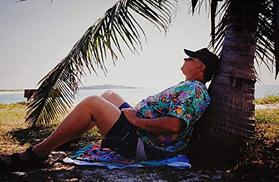Therapeutic gas, legal wrangling, cheesy THC bust, and more
17 Sep 2019
Posted by Andrew Kantor
Max Mason passes
We were saddened to learn of the passing of Max Mason, who served as 1985-86 GPhA president, on September 7. A service celebrating his life will be held at Patriot Hall, 320 Emberson Drive in Ringgold [map] this coming Sunday, September 22, at 2:00 p.m.

Help Mercer students help the Bahamas
A year ago, Gil Arquisola and four other student pharmacists from Mercer planned a rotation in the Bahamas. Little did they know that they would be helping with recovery from a catastrophic hurricane.
Before they leave in a few weeks, Gil and his colleagues are hoping to raise some funds for the relief efforts there. They’ve set up a GoFundMe page with the hopes of raising just $5,000.
“Before we head off towards our rotation, my colleagues and I humbly request your help with financial donations that can help us to provide clothing, supplies, and various items that are being requested to help with relief efforts. ANY donation is greatly appreciated and will be utilized to purchase items from a list that has been provided by our preceptor.
Visit the page to make a donation, or drop him a note at gillian.cenon.arquisola@live.mercer.edu if you have questions.
Purdue goes bankrupt … maybe
Well, it’s trying. The company want to shield itself — and more important, its owners, the Sackler family — from more than 2,600 lawsuits over its role in igniting and furthering the opioid crisis.
But wait: The states aren’t on board, in part because they’re suing both Purdue and the Sackler family, which has more money than the company. Purdue is worth at most about $10 billion, which isn’t much when spread across the states, towns, and cities hit by the crisis. The proposed deal would protect the Sacklers themselves.
Fun fact you might have missed: The Sacklers were caught over the weekend having tried to take at least $1 billion out of Purdue Pharma and sneak the money into offshore accounts. And that info comes from just a single subpoena (out of 33) from the New York attorney general; more are pending to uncover the family’s money-laundering operations.
Legal maneuvers
In the other opioid trial (the one in Ohio), the drug distributors and retail chains being sued are trying a surprise legal move: They want to disqualify the judge overseeing the case. Why? He had said he is hoping for a speedy resolution to (as the New York Times put it) “bring relief as quickly as possible to local governments and individuals hit hard by crisis.” That, say the defendants, proves Judge Dan Polster wants them to lose.
This is the second unusual move in the case. Previously, attorneys general from several states tried to stop the trial because the plaintiffs are towns and cities — they say only states should be involved.
Ranitidine recall?
Remember the valsartan recall because of potential cancer-causing impurities? Now those same impurities turned up in ranitidine — aka, Zantac. No recalls … yet.
Walmart Health update
In case you’re curious about the Walmart Health center opening in Dallas, Georgia, International Supermarket News reprinted the press release for your enjoyment. Our favorite part: The pharmacy. It’s not just a pharmacy — it’s a “reimagined experience.” (Seriously*.)
Got concerns about seeing a physician or dentist in a Walmart? “The Walmart Health center,” the company makes clear, “will be operated by qualified medical professionals.”
* “I can imagine quite a bit.” —Han Solo
Office-based physicians write a lot of off-label scripts
So finds a new study out of Rutgers. A few fun facts:
- 18.5% of visits ended with an off-label prescription.
- 83% of newborns got one.
- Girls were more likely to get one, as were kids who were already taking other meds.
- Over the 10 years studied, “[O]ff-label orders for antihistamines and several psychotropics increased
over time, whereas off-label orders for several classes of antibiotics were stable or declined.”
“Therapeutic medical gas”
People who invested in “molecular hydrogen” water machines, which they heard about on social media, are shocked — shocked! — to find that this ‘health miracle’ is far, far from miraculous.
Trusii operates in the largely unregulated $40 billion-a-year U.S. market for dietary supplements, where pseudoscience and bogus assertions are rampant. The claims and promises can spread virally to millions of people on social networks, the same way that anti-vaxxers have advanced baseless notions about the dangers of vaccinating children.
Elsewhere: Big cheeses
So Wisconsin had itself a big ol’ bust: A couple of suburban guys who were selling THC-filled vaping cartridges out of their home. (Such “street-made vaping products” are a prime suspect in the Mysterious Vaping Illness that continues to confound health officials.)
The Long Read: RICO edition
“Inside the drug industry’s
plan to defeat the DEA” from the Washington Post.
The industry enlisted members of Congress to limit the powers of the Drug Enforcement Administration. It devised “tactics” to push back against the agency. And it commissioned a “Crisis Playbook” to burnish its image and blame the federal government for not doing enough to stop the epidemic.


